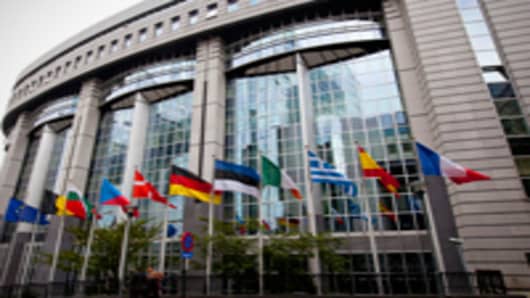Politics has prevented a swift resolution to the Greek sovereign debt crisis that now threatens to engulf the monetary union, Myles Bradshaw, Senior Vice President and Portfolio Manager at PIMCO told CNBC.
"There is no technical reason why the ECB should reject Greece collateral, it's just about politics," Bradshaw said in an interview.
"There are many ways to restructure the debt and you could replicate what's happened in Ireland by providing liquidity through the Emergency Liquidity Assistance (ELA) program and securitize loans on Greek banks and guarantee Greek collateral via the European Financial Stability Facility (EFSF)," he said.
Identifying the unintended consequences of restructuring, such as contagion, could counter a disorderly process, according to Bradshaw.
The ECB has so far insisted that Greek bonds are not eligible as collateral and this would offer a way around that, Bradshaw argued.
Greece is on the brink of defaulting on its huge public debt, and with Portugal and Ireland also having been bailed out by the EU and Italy now facing serious questions about its debt, the survival of the European Union hangs in the balance.
With Germany and the ECB at loggerheads over how to deal with and contain the sovereign debt crisis spreading through the euro zone, an alternative to a default is being sought urgently to prevent contagion.
German Chancellor Angela Merkel and France's president Nicolas Sarkozy are meeting Wednesday in Berlin ahead of Thursday's summit to discuss the sovereign debt crisis.
The summit will see EU leaders and the IMF's managing director Christine Lagarde meet in Brussels to attempt to thrash out a deal but Europe's paymaster Germany is reluctant to pay out again until more decisive action is taken by the Greeks themselves.
Bradshaw said that political will and compromise would come through in the summit.
"In the next two days we will get an agreement in principle about what to do next, a decision on funding Greece for the second program as well as an agreement about what sort of private sector involvement we have.
Leaders are focused on getting a political agreement," he said.
Markets would view the summit negatively if there is only limited discussion on Greece and not on the wider issues to tackle the contagion risk, but this is unlikely, Bradshaw added.


